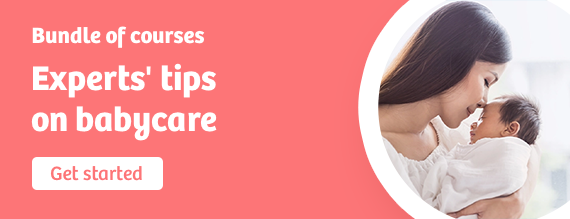Covid and babies: All your questions answered
Although Corona virus cases have decreased significantly, we are not completely our of the woods yet. In this article, I will answer the questions related to covid and babies, to help ease the mothers concerns.


Can newborns and babies get Covid?
It appears that women infected with the coronavirus can, in very rare cases, pass the disease to her baby. Infants can also become infected shortly after being born. Pregnant women should take extra precautions, including talking to their doctor about getting a COVID-19 vaccine, to avoid the coronavirus. There is no evidence that the virus causing COVID-19 is present in breast milk but because there is a possibility of spreading COVID-19 during breastfeeding through respiratory droplets, it is very important to follow safety guidelines.
What are the symptoms of Covid for babies?
According to the U.S. Centers for Disease Control and Prevention (CDC), most newborns who test positive for the coronavirus have mild symptoms or none at all, and recover, but serious cases have occurred.
Generally, COVID-19 symptoms in kids and babies are milder than those in adults, and some infected children may not have any signs of being sick at all.
COVID-19 symptoms for children and adults include:
- Cough.
- Fever or chills.
- Shortness of breath or difficulty breathing.
- Muscle or body aches.
- Sore throat.
- New loss of taste or smell.
- Diarrhea.
- Headache.
- New fatigue.
- Nausea or vomiting.
- Congestion or runny nose.
Fever and cough are common COVID-19 symptoms in both adults and children; shortness of breath is more likely to be seen in adults. Children can have pneumonia, with or without obvious symptoms. They can also experience sore throat, excessive fatigue, or diarrhea.
However, serious illness in children with COVID-19 is possible, and parents should stay alert if their child is diagnosed with, or shows signs of, the disease.
Parents should immediately seek urgent or emergency medical care if they notice these warning signs in a child:
- Difficulty breathing or catching his or her breath.
- Inability to keep down any liquids.
- New confusion or inability to awaken.
- Bluish lips.
How can we protect babies from Coronavirus?
Babies and toddlers under 2 years old shouldn't wear a mask because:
- They have smaller airways, so breathing through a mask is harder for them.
- If it's hard for them to breathe and they can't tell anyone or take the covering off by themselves, they could suffocate.
- Some homemade masks might have pieces that a baby could choke on, such as strings or elastic bands.
- They will likely try to remove the mask, causing them to touch their face a lot. This can increase their risk of catching and spreading the virus.
You can protect your little one by avoiding large crowds and keeping a safe distance (at least 6 feet) from other people when out of the house.
- Anyone in your household who can get a COVID-19 vaccine should do so. Booster shots also are recommended for adults and kids 12 and older.
- Avoid people who are sick.
- Wash your hands well and often and teach others in your home to do the same. This is especially important:
- when you go back into your home after being outside
- before handling your child
- before breastfeeding or preparing a bottle or food
- Clean surfaces and objects that people touch a lot (like doorknobs, countertops, and cellphones).
- Try not to touch your eyes, nose, and mouth.
- Sneeze or cough into a tissue or your elbow, not your hands.
- Wear a mask at home if you are sick. Try to limit contact with your child until your symptoms are gone.
- If you take your child out in an infant carrier, you can place a blanket over the carrier while it's within your view. Make sure the blanket doesn't touch the baby. Wipe down the carrier or stroller when you get home.
Treatment for babies infected with Covid
If your baby or child has mild COVID-19 symptoms, you can likely care for them at home about the same way you would if they had the flu, mainly by cleaning the nose with saline and suction and giving antipyretics for discomfort. There are not yet any specific, proven medications to treat COVID-19 in adults or children. In more serious cases, your baby or child might need hospital treatment for symptoms and complications caused by the coronavirus. These include:
- oxygen therapy
- ventilation (in extremely severe situations)
- medication to help with breathing
- medication for superimposed infections
Can I Take My Child to the Doctor's Office for Vaccines and Other Care?
Yes. Doctors' offices have taken steps to keep patients safe. Despite the pandemic, t is very important to do routine checkups to ensure your child is growing and developing normally, to diagnose problems early in case any develop, and to stay up to date on the routine vaccinations to prevent illness.






